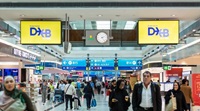 Dubai Airports plans to replace the world’s busiest airport Dubai International (DXB) with an even bigger one as demand for passengers continues to grow at an exponential pace, its chief executive officer Paul Griffiths said on Wednesday during the ongoing Dubai Airshow 2023.
Dubai Airports plans to replace the world’s busiest airport Dubai International (DXB) with an even bigger one as demand for passengers continues to grow at an exponential pace, its chief executive officer Paul Griffiths said on Wednesday during the ongoing Dubai Airshow 2023.
“Once we’ve reached about 120 million (passengers a year) — which is what we think our total capacity at DXB (Dubai International) is at the absolute maximum with everything optimised — we are going to need a new airport. That is going to have to happen at some stage during the 2030s,” Griffiths told AFP.
According to Khaleej Times, this comes as the Dubai Airports projected DXB’s annual passenger traffic to reach 86.8 million, surpassing 2019 numbers as record-breaking figures were expected to continue in the final quarter of 2023.
Currently, the DXB can manage 100 million passengers every year — but innovative technologies, refurbishments, and more efficient use of space and resources could expand its capacity to 120 million.
Griffiths revealed that they would be working on the mega-airport’s design elements over the next few months.
He said: “It stands to reason that Al Maktoum International has to be even bigger and even better (than Dubai International)… This will be a project that extends way into the 2050s because we take the long-term view here.”
“We always knew that when the pandemic struck, there’d be an equal and strong recovery because people under lockdown for two years were denied the ability to travel. And so that’s why we’ve bounced back so quickly,” he told AFP.
He, however, didn’t disclose details on the price tag or capacity target for the new airport. However, he elaborated that the new airport would be designed on a modular basis rather than based around terminals, which will make it easier to expand over time.
“We are not planning an airport that has terminals. We’re going to completely change the business model for airports, make them actually far more intimate and get rid of all the legacy processes that we’ve had to subject our customers to, for far too long,” he added.
Surpassing projections
DXB, the world’s largest hub, recorded 22.9 million passengers in the third quarter — the highest quarterly traffic since 2019, taking the total year-to-date traffic for the first nine months to 64.5 million passengers. This marks a 39.3 per cent increase compared to the same period in 2022 and one per cent above 2019.
Thanks to the successful handling of the pandemic, the UAE’s aviation sector has been expanding at an exponential pace as confidence in the country’s leadership, economy and capabilities see a massive boost.
Dubai’s tourism sector also received record visitor numbers for the first nine months of 2023, attracting 12.45 million international visitors, up 23 per cent year on year and exceeding the previous record registered in 2019 of 12.08 million visitors.
Griffiths said they’re thrilled but not entirely surprised that DXB is all set to surpass the pre-pandemic milestone well ahead of the initial projections by almost a year. “Our outlook for the remainder of this year and the next remains optimistic. Teaming up with our strategic partners, we’re ready for the challenge to continue to exceed guest satisfaction amidst the continuous surge in traffic.”
Top destinations
India was DXB’a top country destination in terms of traffic volume with 8.9 million passengers in the first nine months of the year, followed by Saudi Arabia (4.8 million), and the UK (4.4 million). Other country destinations of note include Pakistan (3.1 million), the US (2.7 million) and Russia (1.8 million). The top cities by traffic were London (2.7 million) and Riyadh (1.9 million), closely followed by Mumbai (1.8 million) and Jeddah (1.7 million).
The airport processed a total of 57.5 million bags in 2023 with a success rate of 99.8 per cent – a rate of 2.5 mishandled bags per 1,000 passengers. In terms of baggage delivery on arrival, 91 per cent of all baggage was delivered within 45 minutes to the guests. The baggage volume in 2023 represents 106.07 per cent of the 2019 baggage volume at Dubai International.
The average waiting time at passport control queues was less than 11 minutes for 96.4 per cent of the arriving passengers and 95.1 per cent of passengers queued for less than six minutes at departure passport control.
The average queue times at security check on departures were less than four minutes for 98.4 per cent of total passengers, it said in a statement on Wednesday.
Cargo registered a surge of 12.3 per cent year on year in the third quarter, to reach 446,400 tonnes.
It recorded 1.3 million tonnes of cargo in the first nine months of the year, registering a minor decline of under 1 per cent.
Flight movements in Q3 surged by 5.1 per cent to 106,000. It handled 308,000 in total flight movements between January and September, up 25.2 per cent year-on-year. (NewsWire)
